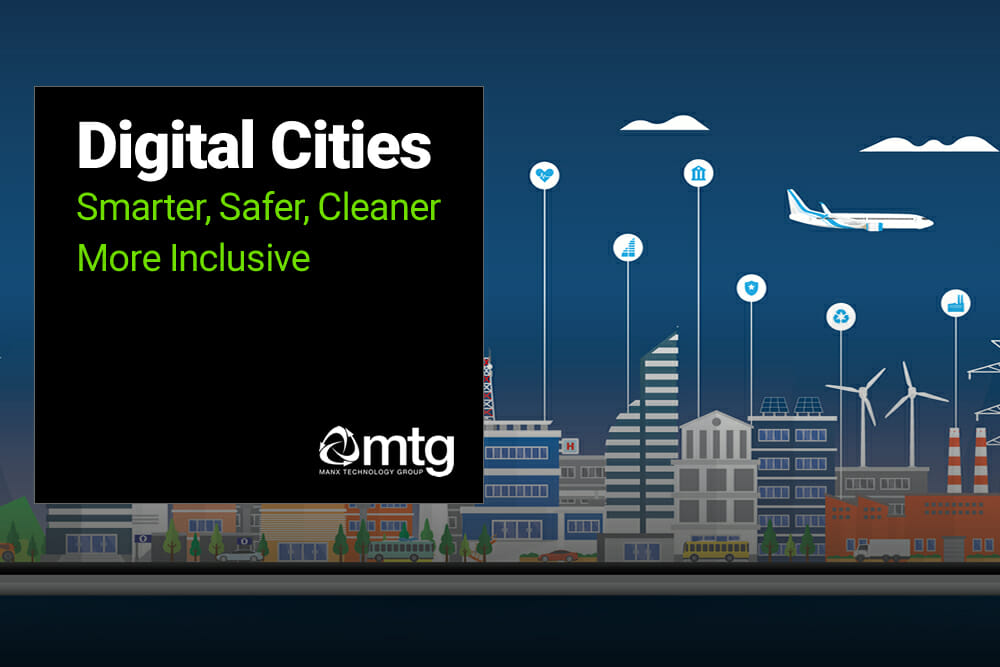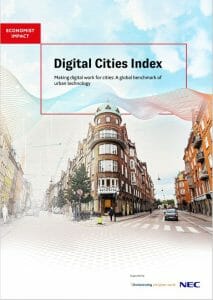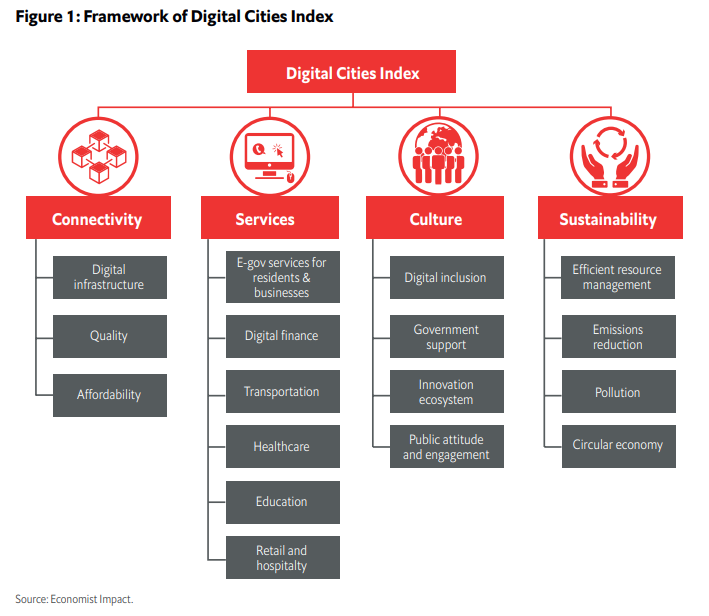
The Digital Cities Index 2022 whitepaper sets out the key factors that have helped cities worldwide adopt digital technologies. The report provides an insight into the many benefits digital technologies offer and highlights best practice examples from the top-performing smart cities.
The report emphasises there is a sizeable bank of experience based on digital technology deployments throughout the world, which can be used when cities choose to form their own policies/strategies. In this blog post, I’ll summarise the key takeaways of the DCI report.
About the Whitepaper
 The Economist developed the whitepaper in partnership with NEC. Alongside the core research team, the Whitepaper was compiled with the input of several industry experts from leading cities and technology vendors. The paper looks at technologies such as AI, Connectivity, IoT and digital identity. MTG has worked on many IoT projects, supporting smart-city projects or assisting with research.
The Economist developed the whitepaper in partnership with NEC. Alongside the core research team, the Whitepaper was compiled with the input of several industry experts from leading cities and technology vendors. The paper looks at technologies such as AI, Connectivity, IoT and digital identity. MTG has worked on many IoT projects, supporting smart-city projects or assisting with research.
Why Digital Cities?
New technologies such as IoT (Internet of Things), AI (Artificial Intelligence), Cloud computing and 5G provide a robust set of tools that can help local authorities and councils make cities, towns and villages smarter, safer, cleaner and more inclusive.
As with any technology adoption or digital transformation programme, there are countless examples of successful deployments against a backdrop of expensive projects that have failed to make an impact.
Key challenges to highlight:
- Inappropriate technology
- Vendor lock-in
- High cost
- Social backlash/opposition
- Data protection/privacy
Highlights
- Barcelona pioneered the idea of giving space and infrastructure to promote tech trials, for example, smart parking & electricity provision.
- Seoul Metropolitan Government will provide citizens access to Government services via the metaverse.
- Singapore is a world leader in e-government services for residents and businesses.
- New York’s Artificial Intelligence Strategy sets out its strategic vision to use ethical AI – it looks at biases and other constraints. [Link]
- Dallas launched a chatbot (“Dalbot“) to help residents with city-specific needs, using AI and natural language processing.
- Jakarta is the ‘Twitter capital of the world, with 7.5% of all tweets in 2013 coming from Indonesia.
- Berlin commenced its open data strategy in 2011; it now features 1,200 data sets as of 2016.
- In 2021, one Indonesian court found the President negligent in tackling air pollution, reducing the life expectancy of Jakarta residents by 5.5 years. [Link]
- The Philippines is the social media capital, with the average resident spending nine hours and 45 minutes daily on social media (on average).

Top cities

Key takeaways
Connectivity
- Connectivity (broadband, mobile, 5G) is required to enable comprehensive digital transformation.
- Unaffordable, unreliable or inaccessible internet services will impact other cities/societal goals, particularly in learning and social inclusion.
- Sizeable ROI exists for “hyper-connected” cities with ubiquitous WiFi coverage, digital technology maturity, cyber readiness and resilience.
- Several cities have implemented free or low-cost schemes to provide internet services to families who otherwise cannot afford broadband.
- Leading cities overwhelmingly recognise the benefit of 5G/IoT networks, with use cases in autonomous vehicles, M2M communications, sensor networks, fixed wireless access and mobile broadband.
- Many cities are ‘5G Ready’, but the new network rollouts do not yet provide ubiquitous coverage, so the gains are still some way off.
- 5G is considered a catalyst for urban digital transformation.
Services
- The efficiency of public services (from local or regional Governments) directly impacts residents and businesses, and digital technologies can significantly enhance these services through digital technology.
- The DCI report has specific metrics, including e-government portals, biometric identification, public transport apps, and digital platforms for health and education.
- Many leading cities have digital ID programmes, although, in many nations, many residents have concerns around privacy and security when it comes to Digital ID.
- Most cities use digital technology for transportation, with many using digital passes to boost tourism and the visitor economy.
- Barcelona has a ‘5G Interactive city project’ zone where 5G services support immersive experiences using AR, VR and special headsets.
- Digital Health is key to improving urban quality of life. DCI looks at indicators such as telehealth, EHR (electronic health records) and pandemic-related applications. This tech all helps support urban wellbeing.
- Asia is home to five out of ten top digital finance cities, leading the way with mobile and digital payments.
- A key driver behind digital finance is how it promotes financial inclusion and overcomes the limitations of bricks-and-mortar banking services.
Culture
- DCI considers digital inclusion, government engagement, digital technology readiness and public attitudes when it evaluates culture.
- Residents of emerging economies have greater digital skills than those in developing cities. DCI evaluated skills such as coding, troubleshooting technical issues and cyber awareness.
- Trust in Government is key to driving online services adoption, particularly ensuring residents are comfortable providing personal or financial information.
- Europe and US cities are leaders in “AI Readiness”, – where AI is a critical tool for optimising traffic, energy use, urban services and city design.
- AI can help tackle broader policy goals such as sustainability and inclusion.
- When developing an AI strategy, cities must balance the need for innovation alongside regulation and oversight.
- Open Data powers urban innovation which promotes accountability, innovation and social impact.
- Western cities have the highest levels of internet freedom.
Sustainability
- Digital technologies can play a significant role in reducing emissions and resource usage.
- IoT and other sensor technology can pinpoint public health risks like pollution and smog.
- IoT sensors can help intelligent buildings adapt to occupancy, and weather, detect water leaks and unlock new mobility sectors like autonomous vehicles/drones.
- Emerging market cities lag in tech adoption but face the gravest threats from climate change, pollution and natural disasters.
- Auckland has 5G-enabled smart lighting that also measures air pollution and noise levels.
- Data from IoT and smart cities enable city officials to develop policies and improve the deployment of public/council assets.
- Most cities are investing in AI and IoT to improve resource usage such as water, power, street lighting and waste management.
- By 2050, cities using innovative technology will help combat congestion and cut commutes by 15-20%.
- Most cities lack plans to develop the sharing economy, such as carpooling and sharing enterprises.
Perspectives
- Understand what the problem is you are trying to solve, then select the technology to fit the problem.
- Urban technology decisions should be taken as part of a dialogue with residents and businesses.
- Digital is now an implicit part of policy objectives rather than a standalone item. Digital is implied.
- Couple the physical element of your city with the digital version (“digital twins”).
- People expect Governments to protect their data and use it for defined purposes.
Where to find the report
You can find the full version of the Whitepaper on the Economist website here:
Digital Cities Index 2022 – Executive summary – Economist Impact
You can then download the Whitepaper and an Excel workbook. The workbook is a macro-enabled spreadsheet, so you will need to check your organisation permits the use of Macros to make full use of the workbook. (As always, take precautions whenever using macros!)


